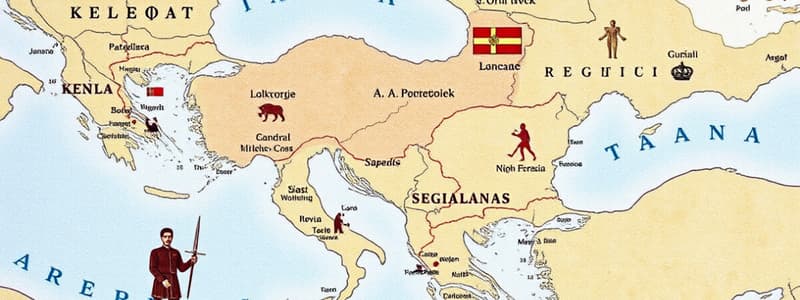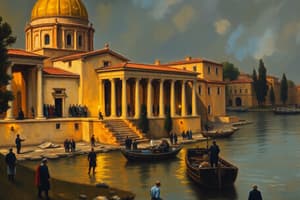Podcast
Questions and Answers
What happened when emperor of Rome, Constantine, decided to create a 'new Rome'?
What happened when emperor of Rome, Constantine, decided to create a 'new Rome'?
The Roman Empire crumbled and fell in 476, the eastern half survived for 1,000 more years, spawning a rich tradition of art, literature and learning.
When and why did the Byzantine Empire fall?
When and why did the Byzantine Empire fall?
The Byzantine Empire fell in 1453, after an Ottoman army stormed Constantinople during the reign of Constantine XI.
What was the purpose of Byzantium?
What was the purpose of Byzantium?
The site of Byzantium was ideally located to serve as a transit and trade point between Europe and Asia Minor.
What was the official religion for Rome?
What was the official religion for Rome?
What was Rome's culture?
What was Rome's culture?
What is special about the Byzantine Empire?
What is special about the Byzantine Empire?
What took place after Constantine's death?
What took place after Constantine's death?
What was significant about Eastern Rome's geographic location?
What was significant about Eastern Rome's geographic location?
Who were the rulers or patriarchs of the five patriarchates of Rome?
Who were the rulers or patriarchs of the five patriarchates of Rome?
What was Byzantium's official language?
What was Byzantium's official language?
Who took over the Byzantine Empire?
Who took over the Byzantine Empire?
What were Justinian's accomplishments?
What were Justinian's accomplishments?
What was lost due to threats from Muslim armies?
What was lost due to threats from Muslim armies?
What caused debt in the Byzantine Empire?
What caused debt in the Byzantine Empire?
What was the movement from iconoclasm to monasticism?
What was the movement from iconoclasm to monasticism?
What consisted in the Byzantine Empire's golden age?
What consisted in the Byzantine Empire's golden age?
What was the new official language of the state?
What was the new official language of the state?
What happened with the Crusades?
What happened with the Crusades?
What was the Byzantine fall and legacy?
What was the Byzantine fall and legacy?
Flashcards
Emperor Constantine's Impact
Emperor Constantine's Impact
Established a 'New Rome' at Byzantium, leading to the Eastern Roman Empire's survival and eventual fall of the Western Roman Empire in 476.
Fall of Byzantine Empire
Fall of Byzantine Empire
The Eastern Roman Empire, also known as the Byzantine Empire, ended in 1453 when the Ottoman army conquered it.
Byzantium's Geographic Role
Byzantium's Geographic Role
Served as a vital transit and trade hub connecting Europe and Asia, which increased its strategic value.
Constantinople's Strategic Location
Constantinople's Strategic Location
Signup and view all the flashcards
Christianity's Official Status
Christianity's Official Status
Signup and view all the flashcards
Byzantine Cultural Identity
Byzantine Cultural Identity
Signup and view all the flashcards
Byzantine Empire's Longevity
Byzantine Empire's Longevity
Signup and view all the flashcards
Justinian I's Accomplishments
Justinian I's Accomplishments
Signup and view all the flashcards
Justinian's Expansion Costs
Justinian's Expansion Costs
Signup and view all the flashcards
Territorial Losses
Territorial Losses
Signup and view all the flashcards
Economic Decline
Economic Decline
Signup and view all the flashcards
Iconoclasm
Iconoclasm
Signup and view all the flashcards
Impact of the Crusades
Impact of the Crusades
Signup and view all the flashcards
Emperor Alexios I's Plea
Emperor Alexios I's Plea
Signup and view all the flashcards
Final Decline
Final Decline
Signup and view all the flashcards
Byzantine Legacy
Byzantine Legacy
Signup and view all the flashcards
Study Notes
Fall of the Roman Empire and Byzantine Empire Overview
- Emperor Constantine established a "New Rome" at Byzantium, leading to the eventual fall of Western Roman Empire in 476, while the Eastern Roman Empire thrived for another thousand years.
- The Byzantine Empire fell in 1453 after the Ottoman army stormed Constantinople during the reign of Constantine XI.
Geographic and Strategic Significance of Byzantium
- Byzantium served as a crucial transit and trade point between Europe and Asia, enhancing its strategic importance.
- Constantinople's location on a strait made it difficult to conquer and supported a stable administrative center and economic resources.
Religion and Cultural Influence
- Christianity was established as Rome's official religion in 325 at the Council of Nicaea, marking a significant cultural shift from previous pagan practices.
- Byzantine culture blended Christian, Greek, and Latin traditions, with Greek being the official language after Justinian's rule.
Byzantine Empire's Longevity
- The Byzantine Empire was the only organized state west of China to survive from ancient times into the modern age, benefiting from geographic defenses and economic stability.
- Rulers could exert control over economic resources and conscript sufficient manpower to defend against invasions.
Major Rulers and Accomplishments
- Justinian I (527-565) is noted for monumental construction like the Hagia Sophia and for codifying Roman law that influenced future legal systems.
- Under Justinian's rule, the Byzantine Empire expanded but faced financial strains leading to excessive taxation and military overstretch.
Conflict and Decline
- The empire began losing territories in Syria, the Holy Land, Egypt, and North Africa due to assaults by Muslim armies.
- Debt incurred from wars led to economic troubles and administration difficulties, which contributors to the empire's decline post-Justinian.
Cultural and Religious Movements
- A major conflict arose with Iconoclasm, initiated by Leo III, challenging the veneration of religious icons until resolution in 843.
- The Byzantine Empire's golden age fostered artistic patronage and study of ancient Greek literature, though it controlled less territory than at the peak.
The Crusades and Byzantine Relations with the West
- The Crusades (1095-1291) were military campaigns initiated to aid the Byzantine Empire against Turkish threats, yet they heightened animosity between Byzantium and Western Christians.
- Emperor Alexios I sought assistance from Pope Urban II, marking the beginning of the Crusades motivated by religious and territorial objectives.
Final Years and Legacy of the Byzantine Empire
- The empire's economy suffered catastrophic decline under the Palaiologan emperors, culminating in the siege of Constantinople and its fall in 1453 to Mehmed II.
- Despite its fall, Byzantine culture, particularly its Orthodox religious practices and contributions to literature and theology, influenced many Eastern European nations.
Studying That Suits You
Use AI to generate personalized quizzes and flashcards to suit your learning preferences.



